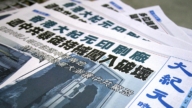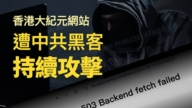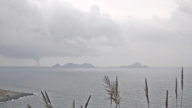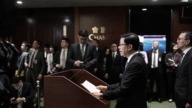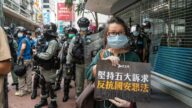【新唐人2011年6月15日讯】这个月10号开始的广州增城新塘大规模冲突,还在持续当中。据香港媒体报导,14号,气氛仍旧肃杀,到处都是冲突之后的痕迹。大批荷枪实弹的军警在街道列队巡逻。当局至今仍然没有向外界真正公开情况,反而声称事态已经受到控制。
增城新塘镇冲突,到15号为止已经进入第5天。此前,经过连续三晚的大规模冲突后,当局出动解放军镇压清场,大举搜捕四川民工。
香港《东方日报》报导,新塘有近万军警严密防控,白天有上千全副武装的武警上街步操示警,晚上则继续宵禁。网上流传13号凌晨军警拘捕千人。不过,当地警方说只拘捕了150人。
目前,有媒体报导认为,新塘事件是本地人和外地人之间的矛盾冲突。但是,在经济发达的广东,近年频频发生大规模抗议示威,学者认为并不是偶然。
草庵居士(经济评论家):“这些暴乱都出现在经济发达地区,这是一个特点﹔第二个特点,民众对官方的一个极大的反抗,而且年轻人比较多﹔而第三个特点,所有这些问题的产生,一个是产生在拆迁问题上,一个是产生在年轻的产业工人上。”
草庵居士表示,中国最近这几年经济虽然有所发展,但是,这个发展在很大程度上是建立在对贫困劳动阶层的盘剥上。
草庵居士:“产业工人也好、贫困的百姓也好,他们在受到盘剥跟剥削非常严重,造成中国严重的两极分化,而这种经济发展所带来的不平衡发展,就会造成很多的怨气。民众没有办法去实现自己的理想,即使你是很聪明能干,由于你的出身不好,或者你的家庭背景不好,你没有办法正常去竞争。”
香港媒体报导,资料显示,广东外来民工有2000万人,主要集中在珠三角的外资或出口型企业。新塘靠近广州,制造业发达,有大量牛仔服装山寨厂,有“牛仔裤之城”之称,大批外地农民工涌到新塘打工谋生,大部分为四川人,占当地人口近半。
《路透社》在早前报导,受通胀、利率上调及人民币升值等多重因素冲击,下半年中国将会有40%的中小企业面临停产、半停产,甚至倒闭。这个现象使得收入就不高的上千万民工,收入下降甚至失业,生活大受影响。
同时,新塘的外来民工反映,还经常受当地政府制定的政策歧视,很多人享受不到当地福利,子女教育也被另册对待,甚至连买摩托车上牌、办暂住证等,都要受到诸多不合理限制,或者要比当地人付更多的钱才能办理。
大陆经济专家:“使用公权的阶层的,它倾向于向民间掠夺经济收入,以抵补他们在通货膨胀中造成的心理恐慌。他们向民间捞钱,不罚款的要罚款,随便甚至颠倒黑白,这样肯定会激化社会矛盾。”
除了新塘事件,同样在广东发生的潮州民众示威抗议,刚过去一周, 网民们发现,身为广东省委书记汪洋并没有作出任何反应。
据大陆媒体的报导,汪洋率团去了德国考察当地经济和社会管理﹔广州市委书记张广甯则率团到菲律宾推介“新广州”。而广州市长万庆良,在新塘民众抗议最紧张的12号,还在水中扒龙舟。
新唐人记者梁欣、李静、薛莉采访报导.
Xintang Crisis and Polarization
The large-scale conflict in Xintang in Guangzhou
occurred on June 10 and continued for several days.
Hong Kong media reported that on June 14,
military police were still patrolling the streets.
However, Chinese Communist Party’s (CCP) media
haven’t revealed the real situation so far.
They only claimed that the situation was under control.
The Xintang incident continued on June 15.
After 3 days of clashing between workers and police,
CCP’s Liberation Army was dispatched to suppress
and hunt down migrant workers from Sichuan.
As per Hong Kong’s Oriental Daily,
Xintang is guarded by nearly 10,000 military police,
who patrol the streets. At night, curfew is imposed.
Over 1,000 are rumored to have been arrested.
Local police claimed that they had only detained 150.
Some media believe that Xintang incident to be
a conflict between the locals and non-residents.
In prosperous Guangdong, protests occur frequently.
Scholars believe that this is not a coincidence.
Caoan Jushi (Economic Critic): First,
the riots take place in economically advanced regions.
Second, protesters oppose the authorities,
and typically a lot of young people are involved.
Third, these problems are caused by forced demolitions
or they are related to young industrial workers.
He says, China’s recent economic development
has been built on the exploitation of poor laborers.
Caoan Jushi: The exploitation of workers and citizens
caused the polarization in China and grievances.
The masses have no means to realize their aspirations.
Regardless of individuals’ intelligence or capability,
family backgrounds lead to unfair competition.
As per Hong Kong media, there are 20 million
migrant workers in Guangdong. They concentrate in
foreign-invested or export firms on Pearl River Delta.
Xintang, close to Guangzhou, is known as “jeans town”
because of its large industry of jeans manufacturing.
Most migrant workers in Xintang are from Sichuan.
They are about half of the local population.
As per Reuters, 40% of small and medium firms
in China would cease production or go bankruptcy
in the second half of 2011.
It will negatively impact millions of migrant workers
with reduced pay or even loss of employment.
Migrant workers in Xintang say that
they are discriminated by local government policies.
Many have no benefits. Their children are mistreated.
They face many unreasonable restrictions even to
get license plates and temporary residence permits.
Often, they have to pay more than the locals.
Chinese economist: The officials with power
rob the public to console their own fear of inflation.
Their robbery of people’s money and unfair fines
will consequently trigger social conflicts.
Apart from Xintang, another protest in Chaozhou,
Guangdong, took place a week ago.
Netizens noticed no response from Wang Yang,
the CCP secretary of Guangdong Province.
As per Chinese media, Wangyang went to Germany.
Guangzhou committee secretary Zhuang Guangning
went to Philippines with a business delegation.
Guangzhou mayor Wan Qinliang went dragon boating
on June 12, when Xintang incident was at its peak.
NTD reporters Liang Xin, Li Jing and Xue Li


